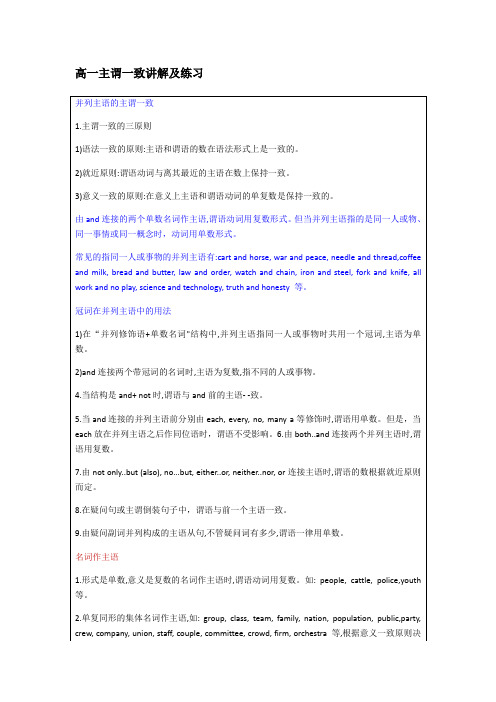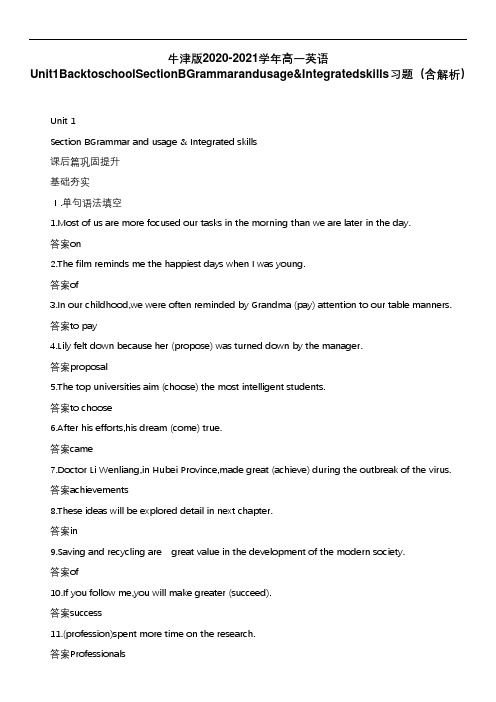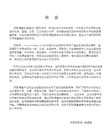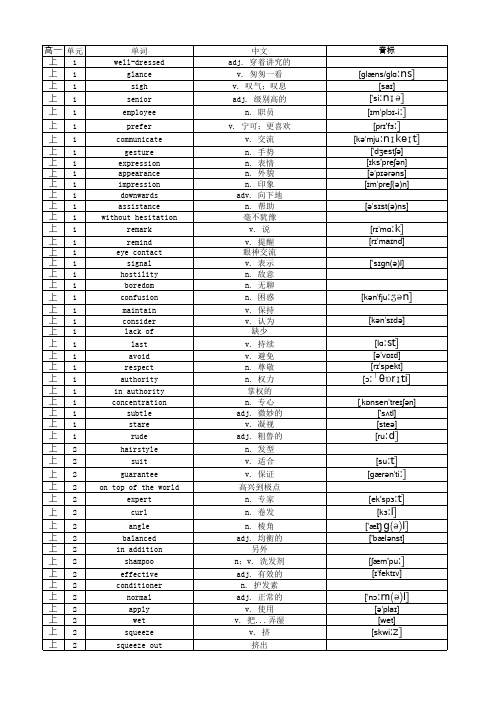上海牛津版英语高一第一学期完整版
高中英语牛津上海版高中一年级第一学期主谓一致讲解及练习(有答案)

高一主谓一致讲解及练习定谓语的数。
3. Chinese, French, mathematics, statistics, electronics, economics, politics, linguistics,optics等表示语言或学科的单词作主语时,谓语动词用作单数。
Chinese, Japanese, French, English 表示某国人时,根据意义一致的原则决定谓语的数。
4. works (工厂),means (方法) series (系列), deer( 鹿), sheep(绵羊)根据所暗示的数来决定谓语的数。
5.以-s结尾的表示由成对部分组成的物体的名词作主语时,谓语动词用复数。
如trousers,glasses, scissors, pants等。
如果这些词与a pair of, a couple of连用,动词的数与pair,couple的数保持-致。
6. clothes, goods, wages, stairs, taxes, earnings, belongings, savings, leavings 作复数用,其后面的谓语动词要用复数。
7. news, music, equipment, luggage, information, furniture, advice, progress等不可数名词作主语时,谓语动词用单数。
复数形式的专有名词作主语1.表示国家城市、机构、组织的专有名词一般视为单数,作主语时谓语动词用单数。
2.某些表示群岛、山脉、瀑布的专有名词往往作复数用,作主语时谓语动词用复数。
3.以复数形式出现的表示书籍、报纸、杂志的专有名词一般视为单数,作主语时谓语动词用单数。
4.以复数形式出现的表示同姓的一家人或同名、同姓的若干人的名词作主语,谓语动词用复数。
“名词+短语"作主语1.主语之后带有as well as, as much as, rather than, more than, no less than等短语时,谓语动词的数与前面的主语保持一致。
牛津上海版高中英语教材目录汇总

G2
B
Module
Unit
1 Happiness
1 What is beauty? (p.2)
1 Happiness 2 Laughter heals (p.16)
Using English: Using a catalogue (p.30)
3 Colours (p.32) 2 The power of images
Understanding floor plan (p.53)
a
Very vegetarian (p.63) Modal verbs (1) (p.66)
A telephone reservation (p.69)
The changing colours of our crops (p.77)
Relative clauses with relative pronouns as subjects (p.80) Relative clauses with relative pronouns as objects (p.81)
6 Space exploration (p.78)
Project: Famous scientists (p.92) Appendix Ⅰ Strategies (p.94) Appendix Ⅱ Notes to reading passages (p.96) Appendix Ⅲ Grammar glossary (p.107) Appendix Ⅳ Word list in alphabetical order (p.108)
Sentence elements: Subjects, verbs and objects(p.19) Sentence elements: Complements and adverbials (p.21)
牛津上海版高中英语教材目录汇总

G3
B
Module
Unit
1 Endangered animals (p.2)
1 Man and animals
2 Wonderful sea animals (p.18)
Using English: Differences between casual and formal English (p.34)
G1
B
Module
Unit
1 A trip to the theatre (p.2)
1 Extraordinary tales
1 Extraordinary tales 2 Great minds (p.18)
Using English:Writing notices (p.32)
3 Plants (p.34)
My favourite sport (p.3)
Adverbial phrases and clauses of purpose (p.6) Adverbial phrases and clauses of concession (p.7)
Understanding numbers (p.9)
4 Family celebrations (p.50)
Project: Planning a trip (p.66)
5 A tale with a twist (p.68)
3 A taste of literature
6 A Wilde play for love (p.75)
7 The poetry of nature (p.81)
3 Contemporary style (p.34)
2 Aspects of modern life
牛津版2020-2021学年高一英语Unit1习题(含解析)

牛津版2020-2021学年高一英语Unit1BacktoschoolSectionBGrammarandusage&Integratedskills习题(含解析)Unit 1Section BGrammar and usage & Integrated skills课后篇巩固提升基础夯实Ⅰ.单句语法填空1.Most of us are more focused our tasks in the morning than we are later in the day.答案on2.The film reminds me the happiest days when I was young.答案of3.In our childhood,we were often reminded by Grandma (pay) attention to our table manners.答案to pay4.Lily felt down because her (propose) was turned down by the manager.答案proposal5.The top universities aim (choose) the most intelligent students.答案to choose6.After his efforts,his dream (come) true.答案came7.Doctor Li Wenliang,in Hubei Province,made great (achieve) during the outbreak of the virus.答案achievements8.These ideas will be explored detail in next chapter.答案in9.Saving and recycling are great value in the development of the modern society.答案of10.If you follow me,you will make greater (succeed).答案success11.(profession)spent more time on the research.答案Professionals12.They asked me to design a (post) for the activity.答案posterⅡ.短语填空come true,focus one’s attention on,stick to,pay off,aim to,give up,as a result of,(be) based on 1.the heavy rain,the football match was put off.答案As a result of2.After his retirement,he can his personal interests.答案focus his attention on3.Whatever happens,we’ll our promise.答案stick to4.His dream of becoming a university teacher has .答案come true5.You’ll be able to choose a room your own personal taste.答案based on6.Even if the child’s access to schooling is difficult,you should not .答案give up7.To our satisfaction,his efforts on his children will .答案pay off8.We to be there around six.答案aim toⅢ.完成句子1.他们成功地克服了各种困难。
牛津上海英语高一第一学期Unit 1(共22张PPT)

Roll one’s eyes and turn one’s head away
frown
With cultural differences between people, people from different countries greet in different ways.
• The Japanese will ___b__o_w________ when they meet.
The Arabs prefer to ____k_i_s_s__o_n__t_h_e__n__o_s_e__ when they meet..
Many people from different countries will ______s_h__a_k_e_ hands on formal occasions.
5.standing at _a_l_itt_le_d_i_st_a_n_ce_ _w_it_h_o_p_en__ha_n_d_s
Scanning: 1. the function of a smile
show happiness
put people at ease
Scanning:2. the feelings a smile can show / when to smile
feelings
Sub-topic:Para 2
Para 3
Para 4
Para 5
Para 6
to show __h_a_pp_i_ne_s_s
to show
u_n_h_a_p_pi_n_es_s___ _a_n_g_e_r _
to show _A_. _a_gr_e_e_m_ent
_B_.d_i_sa_g_re_e_m_ent
牛津上海英语高一第一学期Unit 1(共17张PPT)

6. What do the British like eating at the end of dinner? They like to eat dessert at the end of dinner.
adv. inform n. preparation v.
respect encourage / discourage satisfy graduation donation independence independently information prepare
Reading strategy
in Britain
B. excite more students to study
abroad
C. improve her English
D. introduce her exciting and happy
school life in Britain
D
5. The writer felt lucky because ____. C
D. I could be free to e-mail my family and friends back home.
4. The writer’s purpose of writing the
passage is to ____.
A. tell us she doesn’t like school life
上海新教材牛津英语高一上学期英语教案

高一上学期英语讲义Chapter1.Body language Reading章节分析(Reading section )综述本章节通过Debbie和Simon 接人待物时的成功与失败,来说明肢体语言的重要性。
在引导学生对文章进行整体理解同时,培养学生良好的礼仪。
本课的任务有两个:1 对课文进行整体阅读。
培养学生略读(获取大意)、扫读(整理有关信息)、细读(分析篇章结构,慨括中心)等阅读能力。
2 与时俱进。
结合课文以及上海迎世博倡导学礼仪的活动,引导学生畅谈作为东道主该用何种BodyLanguage来迎接四方宾客。
(二)阅读目标1 知识目标:学习课文中重点词、词组、句型和语法。
2 能力目标:提高学生的阅读理解能力和培养学生的阅读技巧。
阅读准备(收集相关资料)、略读(获取大意)、扫读(整理有关信息)、细读(分析篇章结构,慨括中心)等是高中学生必须具备的阅读技能,教师对高一新生可以以本课为例作仔细介绍。
3 情感目标:帮助学生对“body language”有更深入的思考,学会礼貌接人待物。
(三)重点和难点词汇学习1) 核心词汇●senior●appearance●express/expression●impress/impression●middle-aged, well-dressed, part-time●communicate/communication●opposite●greet●cheerful●employ (employer, employee)●colleague●customer●gesture2) 拓展词汇●sigh●fax●headline (练习D中)●heading3) 词组和短语●glance at,●get down to,●give sb. a good impressi on, make a good impression on…,●without hesitation,●hold up,●prefer…to, would rather do…2 句型学习1)look ( sound, smell, taste, feel) + adj.2)make sb. +v.原形1介绍高中教材的特点,介绍阅读中skimming 和scanning的含义与技巧.1) What is skimming?Skimming is a reading strategy. When we skim a piece of reading, we read it very quickly inorder to get the general idea of the reading. When we skim, we skip the unimportant parts. Therefore, when we skim, we usually only look at titles and headings, pictures and diagrams, and important sentences (usually the first and last sentences of a paragraph) in the reading. Skimming takes only a minute or two, and it helps us get the general outline of the reading and follow the writer’s idea more easily. It is a way to prepare us for a better and detailed understanding of the writer’s ideas.略读是一种阅读方式。
牛津上海英语高一第一学期 Unit4Reading(共28张PPT)

Reading
Can you name any forms of entertainment?
go to the cinema watch a play or opera
sports play games dance comedy
comics
television show
Entertainment means the things you like to do in your free time. There are many kinds of entertainment. Such as reading books, listening to music, going to the parties, watching TV, etc. People with different characters choose different
2.What are they doing? 3.What do you think will happen?
Read the first three and last three paragraphs of the passage and answer these questions.
1. What type of programme is being in the television studio?
A quiz programme.
2. Why did Mandy and Angela go there? They went to watch the show.
3. What surprising thing happened in the story?
Angela won the grand prize.
高一英语Unit1Thephantomoftheoperareading教案牛津上海版S1B

Chapter1. The Phantom of the Opera -Reading一、章节分析(Reading section )(一)综述本章节讲述了一个故事:剧院魅影。
由于此剧在上海曾经演出过,因此学生们对这个主题应该是比较熟悉甚至热爱的。
因此,教师应充分利用学生的兴趣,将此名剧同课文相结合,来进行教授。
本课的任务有两个:1学生通过对课文的学习。
掌握一些核心词汇,例如:capture, kidnap, mask, magically等。
2通过学习课文,了解故事的写作方法,为writing部分做准备。
(二)阅读目标1知识目标学习课文中重点词、词组、句型和语法。
2能力目标通过阅读进一步了解歌剧的历史以及其他方面的知识。
3情感目标对文中的phantom的内心世界进行分析,判断文学作品中人物的善恶和性格的复杂矛盾性。
(三)教学方法采用任务型教学法组织教学,通过听说,讨论等具体活动,达到教学效果。
(四)重点和难点1词汇学习1)核心词汇belowobeyphantomrolekidnapaudiencereleaseburstmagicallyinjure2)拓展词汇operaangelexistcapture3)词组和短语a huge building, with seventeen floorsforce him to leave homemake a secret home for sbgain power overmust bebe crowded within the endbe filling with waterbe shocked atmake sb do4)句型学习1. In the middle of this lake was an island, and on that island, one hundred years ago, lived thePhantom2. …,he was so ugly that his own mother made him wear a mask,…教学设计(Teaching Designs)[链接1]说明:对课文背景知识的介绍。
牛津上海版高一上英语-U5词汇句型精讲-教案

mix (v) 使混合,拌合词组:mix sth with sth 把…与…混合例句:Shake the bottle so that you can mix the oil with the vinegar.摇一下瓶子如此你能够把油和醋混合起来。
【拓展】mixed (a) 混合的例句:For lunch, I think I’ll have the mixed grill.关于午餐,我想我会吃烤杂排。
mixture (n) 混合物,混合剂例句:The city is a mixture of old and new buildings.这都市是新旧建筑的混合体。
sound (v) 听起来看起来例句:She sounded a bit worried. 她听起来有一点担忧。
结实的,健康的,完好无损的词组:safe and sound 安稳无恙例句:Let’s hope everybody is safe and sound.让我们期望每一个人都安稳无恙。
(n)声音例句:Her sound is sweet. 她的声音专门甜美。
vegetarian (n) 素食者例句:I’ve become a vegetarian. 我差不多成为了一名素食主义者。
【拓展】vegetable (n) 蔬菜vegetarianism (n) 素食主义例句:She is an advocate of vegetarianism. 她是素食主义的拥护者。
vegetation (n) 植物例句:The hill has an abundance of green vegetation. 山上有葱郁茂盛的植被。
influence (v) 阻碍词组:influence sb to do sth 阻碍某人做某事例句:My mum influenced me to become a lawyer.我的妈妈阻碍我成为一名律师。
(n)阻碍词组:have an influence on 对…有阻碍under the influence of 在…的阻碍下例句:Generally, parents have a great influence on their children.一样来说,父母对小孩的阻碍专门大。
高中英语高一单词表上海版牛津版

[sɔːs]
['enədʒi] [vəˈraɪəti] [ədˈvaɪz]
[ɪn'kriːs]
上5 上5 上6
上6
上6
上6
上6
上6 上6 上6 上6 上6 上6 上6 上6 上6 上6
上6
上6 上6 上6 上6 上6 上6 上6 上6 上6 上6 上6 上6 上6 上6 上6 上6 下1 下1 下1 下1 下1 下1 下1 下1 下1 下1 下1 下1 下1 下1 下1 下1 下1 下1 下1 下1 下1
[ədˈmɪt]
['siːnəri]
[ə'trækt] [rɪˈflekʃən]
[əˈbændən] [ˈækses]
[ˈsteɪdɪəm] [həʊld]
[ˈempaɪə]
[ˈruːɪn]
[stænd] [əʊvəˈlʊk]
[tuːm]
['wʌndə]
[ˈstjuːdɪəʊ]
[fɪlm] [dɪˈrektə]
normal apply
wet squeeze squeeze out
中文 adj. 穿着讲究的
v. 匆匆一看 v. 叹气;叹息 adj. 级别高的
n. 职员
v. 宁可;更喜欢
v. 交流 n. 手势 n. 表情 n. 外貌 n. 印象 adv. 向下地 n. 帮助 毫不犹豫 v. 说 v. 提醒 眼神交流 v. 表示 n. 敌意 n. 无聊 n. 困惑 v. 保持 v. 认为
[kəʊm] [ˈdæmɪdʒ]
[dɜːt]
[ˈædɪkwət]
[stres]
[ˈremɪdi]
[rʌb] [twɪst] [kənˈstrʌkʃ(ə)n]
牛津译林版高一英语必修一课件:Unit1+School+lifeWord+power

Excuse me, can you tell me the way to…? Excuse me, which is the nearest way to…? Excuse me, how can I get to / arrive at / reach…? Turn right / left, and walk straight on. At the end of the first / second crossing, you will find it on your right / left. You can’t miss it.
[考例1] —When can I come for the photos? I need them tomorrow afternoon. —They ______ be ready by 12:00.
A. can B. should C. might D. need [点拨] 由对话情景可知,前者问什么时候可 以来取照片,答话人对于冲洗照片这个流 程很熟悉,按照常规,到12点就可以准备 好,故选B项,表示“应该、估计可以”之 意。can用于表示理论上的可能性;might 语气太不肯定;need是“需要”的意思。
Twelve science _l_a_b_o_r_a_to_r_i_e_sare available for different experiments. Whether students want to exercise or just want some fun, they can use our g_y_m__. The indoor s_w__im__m_i_n_g__p_o_o_l is open all year round for students who like swimming.
牛津英语高一第一学期练习册答案

牛津英语高一第一学期练习册答案牛津英语高一第一学期练习册答案【篇一:高一下英语练习册答案牛津版】xt>关于高一下英语练习册答案,高一下英语练习册是高一英语下学习非常好的英语材料,大家在进行英语学习的时候,应该尽可能多地进行练习,为帮助大家做好高一下英语的练习工作,在这里为大家提供高一下英语练习册答案牛津版,供大家参考。
【篇二:上海牛津英语高一上unit 5 翻译练习(答案版)】p> translation一练p1011. 蔬菜中含有肉类中无法找到的各种各样的维生素。
(variety)vegetables contain a variety of vitamins not found in meat.2. 不要允许孩子在日常生活中喝可乐来代替喝水。
(instead)children shouldn’t be allowed to drin k coke instead of water in daily life.3. 这对双胞胎长得十分相像,很难区分。
(tell).the twins look so much alike that it is hard to tell one from the other.4. 健康专家告诫我们运动后不要马上喝过多的水。
(warn)health experts warn us not to drink too much water immediately after we do sports.5. 正如人类生存离不开空气和水,人类生存也离不开彼此关爱,因为它是幸福的源泉。
(without)just as human beings cannot survive without air or water, they cannot live without love and care for each other, for it is a source of happiness.6. look at what you’ve done. you___________________________________________. (该更小心才对啊)怎牛p947. 他告诫我不要过分自信。
- 1、下载文档前请自行甄别文档内容的完整性,平台不提供额外的编辑、内容补充、找答案等附加服务。
- 2、"仅部分预览"的文档,不可在线预览部分如存在完整性等问题,可反馈申请退款(可完整预览的文档不适用该条件!)。
- 3、如文档侵犯您的权益,请联系客服反馈,我们会尽快为您处理(人工客服工作时间:9:00-18:30)。
上海牛津版英语高一第一学期HEN system office room 【HEN16H-HENS2AHENS8Q8-HENH1688】上海牛津版英语高一第一学期language-grammarLanguage一、章节分析(一)综述本章节主要语法---动名词在牛津英语中出现两次: 本课和高二(下)第一课。
本课主要介绍动名词作主语、动词宾语、介词宾语;高二(下)第一课主要介绍一些动词后接动名词和不定式的区别。
故本课不仅要介绍课本上动名词的基本用法,还应扩展动名词作真正主语用法,总结后接动名词作宾语的动词,归纳带介词to的动词短语,但不应挖得太深。
(二)目标学习动名词作主语、动词宾语、介词宾语和表语的基本用法。
(三)教学方法口语情景教学法( 教师创设情景,学生主要通过口语训练达到对语言知识的掌握)(四)重点和难点1A部分简单总结一些不含冠词的介词短语2B部分要细讲3C部分省略不讲二、教学设计(Teaching Designs)《牛津英语一让学生找出课文中含有动词-ing的句子,分析比较它们的不同点,引出正题:动名词。
介绍动名词的特点。
教师先利用图片举例,介绍动名词作主语用法,然后在ppt的辅助下通过图片,提示词,学生小组练习。
动名词作动词宾语,介词宾语等讲法同上。
[具体处《牛津英语教理这部分内容的建议见[衔接1;课件:gerund]拓展动名词作真正主语用法,总结带动名词作宾语的动词,归纳带介词to的动词短语。
[具体处理拓展部分内容的建议见[衔接2]。
学生写一段话,尽量多用刚学的动名词;学生做一些教师精选的单项选择,以便巩固所学语法。
[具体处理这部分内容的建议见[衔接3]。
1Ask students to find the sentences which have the form of v.+ing in the text .(possible answers):He gave an encouraging smile.Communicating is more than speaking and listening.She is holding her head up.2Explain the meaning and features of gerunds.Gerunds are –ing nouns. It is a kind of nouns. So in the abovesentences, only “communicating, speaking, and listening” are gerunds.As a noun, gerunds can be used as subject, verb object, prepositionobject, predicative and attributive.Step Two Presentation1Gerunds as subjects1)Example:T: What does shaking hands mean?S1: Shaking hands is a sign of friendship.S2: Shaking hands means that you are friendly.(动名词作主语时,位于动词用单数)2)PracticeStudents practise according to the example. They work in pairs. S1makes questions using the pictures and turning the verbs inbrackets into –ing nouns. S2 chooses answers from the box.Shaking your fist is a sign of anger.Sighing is a sign of sadness.Yawning means that you are sleepy.Closing your eyes means that you are thinking.Whistling means that you are happy.Scratching your head means that you are thinking.Bowing is a sign of respect.(补充讲解句型It is (was) no use/good doing something.)2Gerund as verb objects1)Example:T: I didn’t know you could swim.S: Didn’t you I love/ like swimming.T: So do I. I really enjoy swimming.I don’t. I hate / dislike swimming.I prefer walking.2)Practice:Students work in pairs to make similar dialogues about thepictures. Follow the example.3)Tell students some other verbs which have such usages.admit, appreciate, avoid, be worth, complete, finish, deny, delay,postpone, escape, practice, suggest, miss, allow, permit, forbid,consider, imagine3Gerunds after prepositionsOn her first day at work, Debbie saw the things. She didn’t know what they were for, so she asked Mr Yang.Work in pairs to complete their conversation. S2 should answer S1,using –ing nouns made from the verbs in the box along with“for”.1)Example:T: Excuse me, but what are these _keys_____ for?S: They’re _for____ __locking_____ the drawers of the desk.2)Practice:Students work in pairs to make similar dialogues about thepictures. Follow the example.S1: And this _______S2: It’s _______ ________ letters.S1: What about these _______ ________S2: They’re _______ ________ your paper together.S1: This ________. What’s it for?S2: It’s _______ _______ the dates on documents.S1: And these ________S2: They’re _______ ________. They’re a present for your firstday at work.( 补充总结含介词to的动词短语:be (get)used to, get down to, lookforward to, lead to, payattention to, be devoted to, object to例如:Let’s get down to talking about your future.I’m look forward to hearing from you.)(见课件:gerund)[链接2]13)It’s worth doing…4)…can’t help doing…〖典型例句〗1)It’s no use crying over the spilt milk.2)The place is well worth visiting again.3)There is no point cheating in the exam.4)We can’t help laughing at the joke.5)It’s no good copying others’ homework.2下列动词后常接动名词做宾语1)admit, appreciate, avoid2)complete, consider3)delay, deny4)endure/stand, enjoy, escape, excuse5)finish6)imagine7)keep8)mind, miss9)postpone, practice10)resist, risk11)suggest巧记这些动词的诀窍:继续坚持勿停止;盼望完成莫推迟错过成功会后悔;惯于冒险须放弃避免原谅不逃脱;忙于欣赏禁不住介意练习很值得;考虑建议末延迟想象无用已无益;记得做过勿忘记禁止使用不定式〖典型例句〗1)I enjoy reading books in bed though it is not a good habit.2)I can’t imagine going to any place without you.3)Would you mind opening the door for me?4)He suggests reading English every day.5)The bird missed being shot.6)He escaped being punished by running away.3下列动词短语种to为介词1)be (get)used to2)get down to3)look forward to4)pay attention to5)be devoted to6)object to7)lead to〖典型例句〗1)I used to get up late, but now I’m used to getting up early.2)After discussing with his deskmate, he got down to writing hiscomposition.3)I’m looking forward to hearing from you.以下几点可以在以后单元里讲解:1)need/ want / require 句型2)love, like, hate 后接 to do 与doing 作宾语的区别3)stop, remember, regret, try, mean, go on, forget后接 to do 与doing作宾语的区别4)allow, permit, consider, advise后接 to do 与doing 作宾语和宾补的区别5)动名词的时态和语态6)动名词的复合结构[链接3]1.Do keeping _____, will you?A. to tryB. tryC. having triedD. trying2. We are all looking forward ______ Mr. Smith next week.A. to seeB. of seeingC. at seeingD. to seeing3. He spent all his time ______ for the final examination.A. to prepareB. of preparingC. in preparingD. to preparing4. The boy is only five years old, but he is quite used _____ the telephone.A. to answerB. to answeringC. of answeringD. by answering 5. ______soundly is better for your illness than taking medicine.A. To sleepB. SleepingC. SleepD. Having slept6. Sometimes when I look into the sky, I feel like ______ a trip somewhere.A. to makeB. makingC. makeD. to go for7. I consider _____ of every fish is a kind of murder.A. takingB. a takingC. the takingD. to take8. My grandfather is a rich man, but ______ money does not solve all his problems.A. hasB. to haveC. havingD. having had9. It is no good ______ him to see you off.A. to expectB. expectingC. of expectingD. for him to expect 10.There is one more book worth ______.A. readB. of readingC. being readD. reading11.He liked ______ many questions at the press conference.A. being askedB. askingC. of askingD. ask12.We had no trouble ______ the path through the forest.A. to findB. for findingC. findingD. with findingII.用括号里的动词的正确形式填空:1. He insisted on _______(do )the work in some other way.2. The windows want / need / require to be cleaned. That is, they need /want / require _____ (clean).3. He practiced _______(play) the piano every day.4. She doesn’t mind ______( work ) overtime.5. It will mean ______( benefit ) your company and mine.6. Have you decided to put off ______( go ) to the seaside?7. Peter kept (on) ______ (ask) questions.8. It’s a waste of time ______( argue) about it.9. _____ ( talk ) is easier than doing.10. Have you finished _______ (do) your homework?III.翻译:1. ______(每天晨读一刻钟)is very important in learning English.2. It’s no use _______(叹气).3. Debbie enjoys _______(微笑着与客户交流).4. John has just given up ______(吸烟).5. I ______(一直盼望着访问)China again.6. He run off to avoid ______(看见)by his class teacher.7. This machine is for ______(切纸).8. This book is well worth ______(读).9. ______(挥动拳头)is a sign of anger.10. Mr. Yang suggested/advised ______ (看着顾客的眼睛)to make a good impression on him.IV.拓展题:1.---You were brave enough to raise objections at the meeting.---Well, now I regret _____that.A. to doB. to be doingC. to have doneD. having done2.The patient was warned _____ oily food after the operation.A. to eat notB. eating notC. not to eatD. not eating 3.She looks forward every spring to _____ the flower-lined garden.A. visitB. paying a visitC. walk inD. walking in4.The little time we have together we try _____ wisely.A. spending itB. to spend itC. to spendD. spending that 5.While shopping, people sometimes can’t help ______ into buying something they don’t really need.A. to persuadeB. persuading D. being persuaded D. be persuaded6.What worried the child most was ______ to visit his mother in the hospital.A. his not allowingB. his not being allowedC. his being not allowedD. having not been allowed7.Tony was very unhappy for _____ to the party.A. having not been invitedB. not having invitedC. having not invitedD. not having been invited8._____ to sunlight for too much time will do harm to one’s skin.A. ExposedB. Having exposedC. Being exposedD. After being exposed9.The discovery of new evidence led to _____.A. the thief having caughtB. catch the thiefC. the thief being caughtD. the thief to be caught10.One learns a language by making mistakes and _____ them.A. correctB. correctingC. correctsD. to correct11.---You should have thanked her before you left.---I meant _____, but when I was leaving I couldn’t find her anywhere.A. to doB. toC. doingD. doing12.In some parts of London, missing a bus means_____ for another hour.A. waitingB. to waitC. waitD. to be waiting13.---What’s made John so angry?---______ the tickets for the concert.A. LoseB. To loseC. Because of losingD. Losing14. The day we are looking forward to _______ at last.A. arrivingB. arriveC. arrived D. arrives15. Mr. Reed made up his mind to devote all he had to ____ some schools for poor children.A. set upB. setting upC. have set upD. having set up附答案:Ⅰ.单选:DDCBBBCCBDBCⅡ.用括号里的动词的正确形式填空:doing, cleaning, playing, working,benefiting,going, asking, arguing, Talking, doing Ⅲ.翻译:1.Reading for a quarter of an hour every morning2.sighingmunicating with customers with a smile4.smoking5.am looking forward to visiting6.being seen7.cutting up paper8.reading9.Shaking one’s fist10.looking at customers’ eyesⅣ.拓展题:DCDBD BDCCB BADCBChapter2. Care for hair-More Reading教案一、章节分析(Reading section)(一)阅读地位(Reading Position)1)more language input同样围绕着头发这个主题,但给学生提供了一些额外的相关信息。
